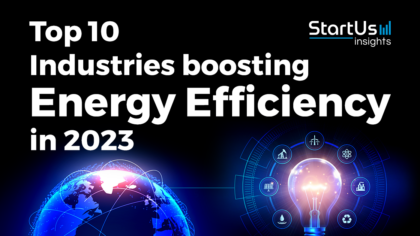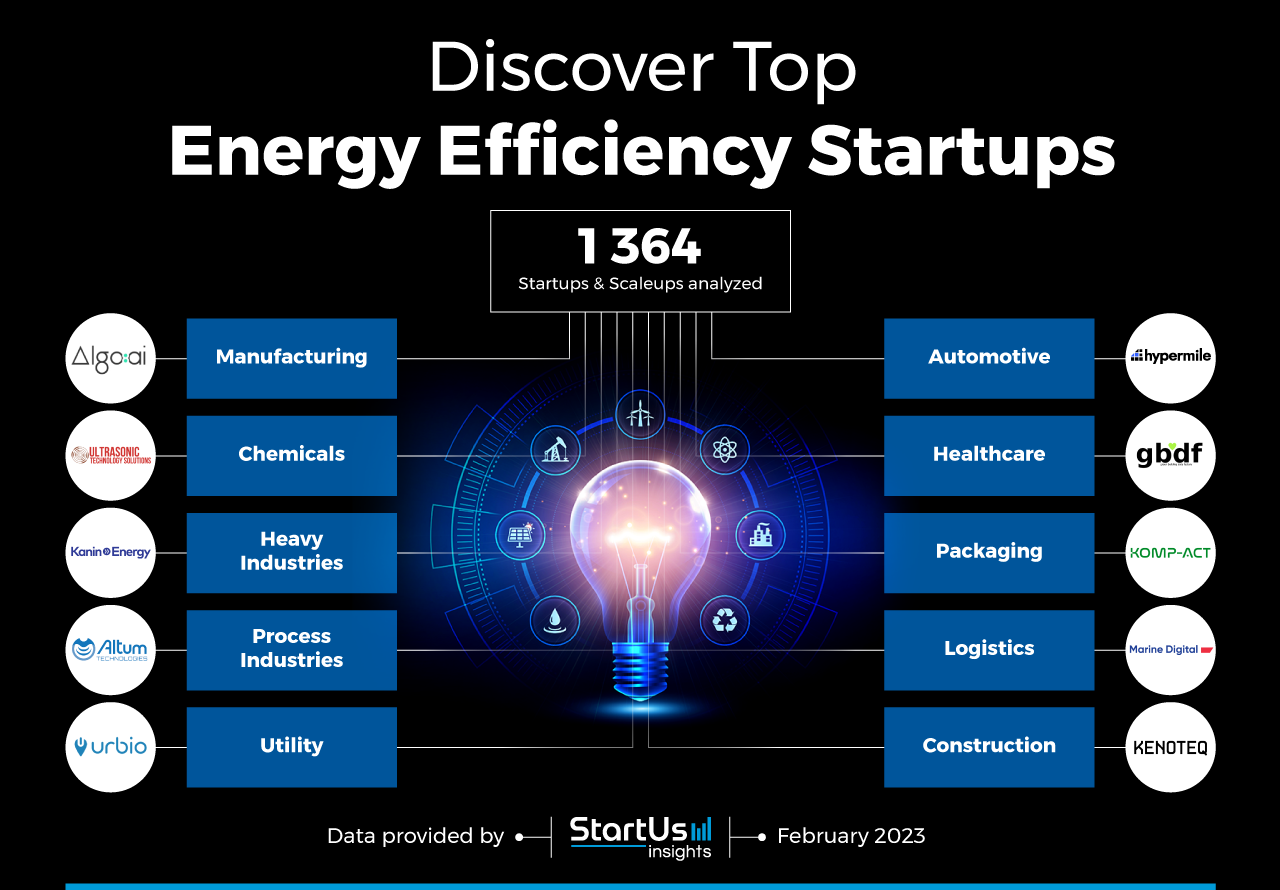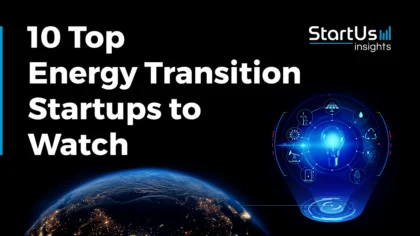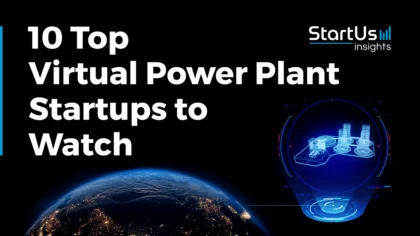Accelerate Productivity in 2025
Reignite Growth Despite the Global Slowdown
The war in Ukraine is disrupting the global energy supply chain, increasing oil prices and, in turn, energy costs. Therefore, businesses are looking for energy-efficient solutions to reduce their operational costs and energy requirements. That is why we give you data-driven insights into the top energy efficiency examples based on our analysis of 1364 companies and technologies. Here, you get to discover 10 energy efficiency trends and 10 hand-picked startups improving energy efficiency across industries.
Innovation Map highlights the Top Applications of Energy Efficiency Solutions across 10 Industries
For this in-depth research on the Top Energy Efficiency Trends & Startups, we analyzed a sample of 1364 global startups and scaleups. These insights are derived by working with our Big Data & Artificial Intelligence (AI)-powered StartUs Insights Discovery Platform, covering 2 093 000+ startups & scaleups globally. The platform quickly delivers an exhaustive overview of emerging technologies within a specific field as well as identifies relevant startups & scaleups early on.
In the Innovation Map below, you get an overview of the 10 industries adopting energy efficiency applications as well as 10 startups enabling this. This research gives you data-driven innovation intelligence that improves strategic decision-making by giving you an overview of emerging technologies & startups improving energy efficiency and sustainability.
Interested to explore all 1300+ energy efficiency startups & scaleups?
Explore 10 Emerging Energy Efficiency Examples
1. Manufacturing
Manufacturing facilities consume massive amounts of energy to run industrial machines and heating systems. An increase in energy costs significantly affects their operational expenses. Therefore, startups leverage advanced analytics, AI, and other technologies to reduce industrial power usage.
They include solutions for better building management, assisted maintenance, and waste energy recovery. Additionally, startups utilize energy-efficient integrations such as enhanced reactors or motors to reduce energy consumption. Other startups offer on-site renewable energy generation systems that allow manufacturers to reduce dependence on the grid.
Algo8 facilitates Manufacturing Process Optimization
Canadian startup Algo8 develops iProcess, a manufacturing process optimization platform. It utilizes predictive analytics to suggest design and process updates. Besides, the platform provides visibility into manufacturing operations and streamlines the processes.
This allows manufacturers to mitigate operational inefficiencies and optimize energy consumption. Algo8’s solution also allows them to avoid production downtimes and maximize business outputs.
2. Chemicals
Annual energy usage of the chemicals industry is very high and emits a massive amount of carbon dioxide, contributing to climate change. To reduce its energy footprint, startups offer energy-efficient solutions for the chemical industry. For instance, many startups develop novel chemical processing methods that replace energy-intensive processes.
Additionally, chemical manufacturing facilities deploy energy-efficient retrofits to reuse the otherwise wasted energy or increase the overall machine performance. Since the sector relies mainly on boiler and heat systems, there are a lot of innovations in that area to optimize energy use.
Ultrasonic Technology Solutions advances Chemical Powder Drying
Ultrasonic Technology Solutions is a US-based startup that offers Ultrasonic Drying Process, a proprietary drying process. Instead of heat, the startup’s piezoelectric transducers use high-frequency vibration for drying.
The water leaves the wet article as a cold mist, which the startup’s device reclaims. This technology uses less energy and is much faster than conventional dryers, reducing carbon emissions.
3. Heavy Industries
Production of heavy articles and materials requires large amounts of power to run machines and transport materials. Therefore, heavy industries see advances in energy-efficient process design and asset monitoring to reduce energy consumption. Startups leverage the Internet of Things (IoT) and big data analytics to monitor the process and machine discrepancies.
This enables heavy industry manufacturers to identify energy wastage and take countermeasures. The energy-intensive sector also integrates waste heat recovery systems to reuse energy lost as heat during operations. These solutions, together, allow manufacturers to reduce their energy costs and improve sustainability.
Kanin Energy develops a Waste Heat-to-Power Conversion System
Canadian startup Kanin Energy creates a waste heat-to-power conversion system for the iron and steel industries. The startup’s station-agnostic solution couples Organic Rankine Cycle (ORC) systems with waste heat. This closed system’s organic fluid heats up to drive the turbine and convert waste heat into electricity.
Gas compressor stations use the generated power for daily operations and save energy costs. Since the startup’s waste heat-to-power solution is a zero-emission system, it improves the sustainability of gas compression and transportation.
4. Process Industries
Industrial process and equipment efficiency have a significant impact on energy consumption. Similar to chemical manufacturing, process industries also utilize energy-efficient integrations and novel process designs to tackle increasing energy costs. Further, other material processing technologies replace energy-intensive traditional methods.
For example, membrane filtration removes particles that ordinary techniques cannot filter and finds use in concentrating and fractioning. This replaces energy-intensive evaporation and centrifugation processes. Such solutions allow process industry manufacturers to address the rising energy costs without significantly increasing operational costs.
Altum Technologies provides Ultrasonic Cleaning
Finnish startup Altum Technologies offers an ultrasonic cleaning solution for food, pulp and paper, chemical, oil, and gas industries. The startup’s patented technology, ZPD Ultrasonic Cleaning, combines traditional ultrasound cleaning with its proprietary beamforming software to focus cleaning power on a target point.
As a result, it tackles the problems of fouling and scaling without unplanned or periodic shutdowns. This increases energy efficiency and reduces the carbon footprint of production operations.
5. Utility
Natural gas and coal sources are a significant part of the power grid. The Russia-Ukraine war, along with climate change, is affecting how utilities evolve. Primarily, the energy utility is moving to renewable energy to enable a low-carbon economy and energy-efficient operations. However, the adoption rates of renewable energy are low. Increasing energy costs now accelerates this transition and will help utilities achieve a clean grid.
For this, startups provide energy planning solutions and renewable energy generation systems. For instance, distributed energy resources (DER) coupled with blockchain-based infrastructure allows consumers to establish energy generation systems. This enables energy utilities to reduce dependence on fluctuating oil prices and add more energy-efficient power sources.
Urbio facilitates Urban Energy Planning
Urbio is a Swiss startup that simplifies urban energy planning. The startup combines energy data from various open and commercial sources and applies machine learning to generate insights into city energy consumption.
This allows utilities to identify CO2 hotspots for district heating, filter buildings for photovoltaic deployment, and optimize energy systems. The startup’s geographic information system thus automates energy system design.

6. Automotive
The automotive sector consumes massive amounts of energy to power industrial operations and vehicles. To reduce this, startups develop energy-efficient production machines and create vehicle fuel optimization solutions, including novel internal combustion engines.
This enables automotive manufacturers to significantly reduce their energy costs, as well as for their customers. In addition, electric vehicle (EV) manufacturers leverage energy-efficient battery systems to reduce the fuel consumption of EVs.
Hypermile provides AI-based Truck Cruise Control
UK-based startup Hypermile offers Hypermile Co-Pilot, an AI-based cruise control system for automotive original equipment manufacturers (OEMs). It is a driver assistance system that controls vehicle speed to optimize fuel efficiency.
Hypermile Co-Pilot also offers hazard alerts like collision and lane departure warnings as well as predicts vehicle movements. This allows vehicle and fleet owners to optimize fuel costs and increases road safety.
7. Healthcare
Lighting, heating, ventilation, and air conditioning (HVAC) systems in hospitals primarily contribute to the high energy consumption in the healthcare industry. Hospital managers utilize building management systems (BMS) to monitor energy usage to find improvement opportunities.
Startups offer IoT and advanced analytics-based solutions to further increase visibility into hospital energy consumption. This allows hospital managers to better understand consumption patterns and identify inefficiencies in electrical, mechanical, or plumbing systems that cause energy wastage.
Green Buildings Datafactory (GBDF) enables Hospital Energy Management
GBDF is a Dutch startup that facilitates hospital energy management. The startup leverages IoT sensors and its platform, G-Hub, to collect building data and provide insights into energy consumption. This allows hospital managers to optimize indoor climate and forecast energy consumption, improving building energy efficiency.
8. Packaging
Adopting robotic systems in production lines and energy-intensive material handling machines increases energy requirements for package manufacturers. As a result, they are integrating automated production lines to speed up production and reduce energy efficiencies.
Unlike systems that require human collaboration, automated packaging systems have high pick and place rates. Further, the packaging industry utilizes materials innovations to enable low-carbon raw material processing, reducing energy costs. To aid this, startups develop materials that require minimal processing to create new packages.
KOMP-ACT offers Energy-Efficient Packaging Automation
KOMP-ACT is a Swiss startup that develops electrical components for energy-efficient packaging automation. The startup’s linear actuators, motors, grippers, and controllers increase packaging machinery speed and flexibility.
KOMP-ACT’s components support a series of packaging operations such as carton packaging, unloading, feeding, and labeling, among others. Moreover, the startup’s energy-efficient programmable electric motion automation solutions readily integrate with existing packaging lines, reducing capital expenses.
9. Logistics
The sudden growth of eCommerce and worldwide shipping services incurs high fuel costs for logistics companies. Besides, the energy rates vary with transportation mode as logistics operations now rely on multimodal transport. To achieve optimum fuel prices, energy efficiency startups develop route optimization solutions for logistics companies.
They utilize real-time transit-determining parameters like fuel prices, weather conditions, and road traffic to optimize cargo transportation routes. This allows logistics fleets to avoid unnecessary stoppages and situations that cause high fuel consumption.
Marine Digital simplifies Maritime Logistics Fuel Optimization
German startup Marine Digital develops a fuel optimization system for maritime logistics operations. It leverages AI and digital twins to provide real-time insights into voyage status and vessel performance metrics as well as facilitates environmental reporting.
The system’s voyage planning feature also takes into account the weather conditions and operational factors. This allows shipping companies and freight forwarders to reduce fleet fuel consumption and energy costs.
10. Construction
Resource-intensive raw materials and processes make construction a high-energy-consumption industry. To increase energy efficiency, construction companies leverage alternative building materials with a much lesser energy footprint.
This includes sustainably manufactured cement, bricks, and other raw materials. Additionally, startups provide energy-efficient power generation systems for on-site deployment. This allows builders to decouple construction operations from the grid and save energy costs.
Kenoteq makes Sustainable Bricks
Kenoteq is a UK-based startup that manufactures sustainable bricks. The startup’s product, K-Briq, utilizes recycled raw materials and a proprietary low-carbon production process.
Besides, it eliminates high-temperature firing, significantly reducing the energy requirements for building projects. This provides the construction industry with a sustainable means to reduce post-construction waste and cut down emissions.
Discover the Latest Energy Efficiency Startups
Every day, new startups and technologies emerge that improve energy efficiency. These solutions span a range of industries, and emerging companies take advantage of novel materials and processes, as well as data, AI, and IoT to implement energy-efficient practices.
For example, US-based startup Building Fit develops fault detection and diagnostics (FDD) analytics software. It is an analytics and visualization platform that collects data from building automation systems (BAS) and IoT devices. The software then offers analysis using KPIs, automated reports, and interactive dashboards, enabling building managers to identify opportunities to optimize building energy efficiency.








